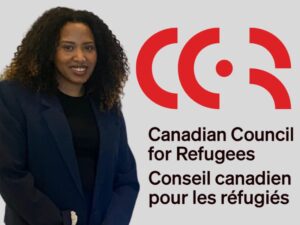Navigating the compassion crossroads: a reflection on the Canadian Council for Refugees’ Fall 2023 Consultation

In a world marked by shifting geopolitical landscapes and humanitarian challenges, Canada stands as a beacon of hope for those seeking refuge and a better life. This message struck me when I attended the Canadian Council for Refugees’ Fall 2023 Consultation in Calgary, November 16 to 18. Focused on Canada’s immigration and refugee crisis, this gathering brought together refugees, migrant workers, activists, industry experts, and community leaders to explore the complexities of the issue and how to foster understanding and compassion for refugees among the Canadian public.
The Consultation kicked off with a working group led by the Canadian Council for Refugees on Overseas Protection and Resettlement, Inland Protection and Immigration and Settlement. Attendees were confronted with staggering numbers. Canada is increasingly reliant on Temporary Foreign Workers (TFW) to fill the labour shortage gaps. The number of TFWs increased seven-fold from 111,000 in 2000 to 777,000 in 2021. We’ve recently seen this in Quebec where it has more than doubled in five years. We were reminded that behind each statistic is a unique human story and that they remain the backbone of Canada’s economy. The crisis encompasses diverse factors, from global conflicts and environmental disasters to economic disparities and persecution, driving people to seek safety and stability on Canadian shores.
Distinguished keynote speaker, Honourable Marc Miller Minister of Immigration, Refugees and Citizenship introduced the process of immigration and was very careful on stating new policies and regulations. He used the time to hear from us, the attendees. Many of us were refugees, migrant workers, policymakers and representatives from grassroots organizations, who asked him about Canada’s current immigration policies. The Minister invited us to connect with him further as needed.

Amidst the policy discussions, the event did not lose sight of the human faces behind the crisis. Personal stories of resilience, courage, and hope were shared, humanizing the statistics. Migrant workers and refugees recounted their journeys, detailing the challenges they faced and the warmth they found upon reaching Canada. These narratives served as a poignant reminder that behind the policy debates are real people seeking safety and a chance for a better life.
The event emphasized the crucial role of community engagement in addressing the immigration and refugee crisis. Panel discussions explored how local communities can become pillars of support for newcomers, fostering integration and understanding. Grassroots initiatives and community-driven programs were highlighted as powerful tools for building bridges and dismantling stereotypes.
As the event concluded, participants were left with a call to action. Beyond the enlightening discussions, there was a shared commitment to turning empathy into tangible change. Advocacy, volunteering, and supporting organizations dedicated to aiding refugees and migrant workers were identified as practical steps that individuals and communities could take to contribute to a more compassionate and inclusive Canada.
For years, KAIROS Canada has called for permanent residency for all migrant workers, and regularization of the estimated half a million undocumented people in Canada, many of whom are working under the table and are vulnerable to abuse and lack of medical care and other supports that Canadians take for granted. We join the Migrant Rights Network in calling for Status for All.
The Canadian Council of Refugees’ Fall 2023 Consultation served as a crucial platform for dialogue, education, and inspiration. It reminded us that while challenges persist, Canada has the potential to be a global leader in providing sanctuary and hope for those in need. By coming together, understanding the complexities of the crisis, and taking meaningful action, we can collectively navigate the compassion crossroads and build a more inclusive and welcoming nation. An important first step, however, is providing Status for All.
By Leah-Seble Shifferaw, KAIROS’ Migrant Justice Team Lead
